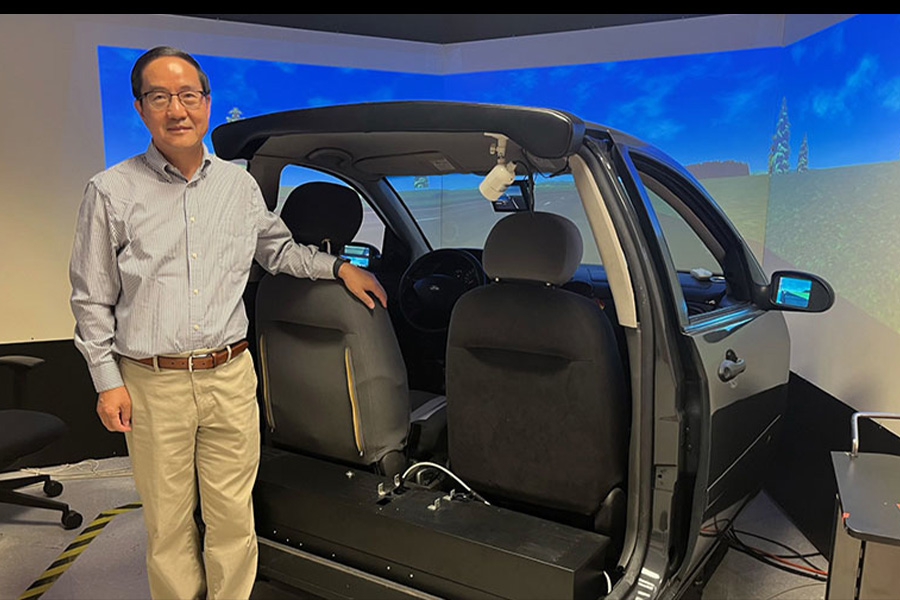September 8, 2024
Purdue's Transportation and Autonomous Systems Institute makes a difference in Indianapolis
Yaobin Chen, Purdue electrical and computer engineering professor in Indianapolis, and his team of researchers at TASI have conducted impactful safety research for nearly two decades.

Yaobin Chen, Purdue electrical and computer engineering professor in Indianapolis, and his team of researchers at TASI have conducted impactful safety research for nearly two decades. (Purdue University photo/Marketing and Communications)
Nearing its 20-year anniversary, Purdue University’s Transportation and Autonomous Systems Institute (TASI) in Indianapolis is continuing to work toward enhancing safety for drivers, pedestrians, cyclists and other vulnerable road users such as e-scooter riders.
Through collaboration and partnership with academics, industry, government and other organizations, Purdue teams at TASI conduct world-class research in connected and autonomous vehicles and intelligent transportation systems, driving innovation through safety discoveries.
“TASI has created a unique environment for collaborative teams of faculty and students in engineering, computer science, medicine and public policy to collectively address challenging research issues in automotive and road safety,” said Yaobin Chen, Purdue electrical and computer engineering professor in Indianapolis and director of TASI.
“By working closely with its industry and academic partners, TASI researchers have developed real-world solutions to the design, development, implementation and evaluation of vehicle automatic emergency braking and collision mitigation systems,” Chen continued. “Many of these solutions have been successfully applied to production vehicles, creating a significant societal impact by reducing crash injuries and even saving lives.”
Since 2009, TASI has secured $20 million in funding for projects involving automotive industry leaders like Toyota, General Motors, Ford, Aptiv and BMW, as well as government agencies such as the Federal Highway Administration, the National Highway Traffic Safety Administration, the National Science Foundation and the Indiana Department of Transportation.
One of Purdue’s longest-tenured partnerships at TASI has been with Toyota, which created the Collaborative Safety Research Center (CSRC) in 2011 to advance safety for the industry through open collaborations with universities, hospitals and other research institutions. The CSRC recently announced new projects to help advance automotive safety industrywide for societal good.
Purdue University in Indianapolis is the academic collaborator for two of those projects, with each focusing on vulnerable road user safety. Purdue researchers will investigate whether the sudden movements of pedestrians and cyclists can be predicted using machine learning as well as examine vehicle sensor strategies to detect those vulnerable road users in hopes of enhancing crash avoidance technology.
“Yaobin and his colleagues at TASI have generated an incredible list of safety enhancement discoveries,” said Milind Kulkarni, professor and the Michael and Katherine Birck Head of Electrical and Computer Engineering at Purdue. “Here in Indianapolis, the heart of the Crossroads of America, these Purdue researchers are making a difference for drivers, cyclists and pedestrians throughout the country.”
TASI research projects have involved pedestrian and bicyclist detection and behavior analysis, human factors for semiautonomous driving systems, mobility and safety needs for underserved populations, and the development of road/road edge data analytics for all 50 U.S. states. The work conducted by Purdue researchers and students in Indianapolis has led to 10 U.S. and foreign patents and generated 150 technical papers, reports and standards.
At Purdue University in Indianapolis, TASI faculty and students can take advantage of innovative research labs stocked with state-of-the-art equipment such as a driving simulator instrumented with a suite of perception and other sensors. TASI owns several other research facilities, including a traffic data analytics laboratory, where researchers apply computer vision and data analysis algorithms to video data to identify, track and predict the behavior of cyclists and pedestrians; and a driving simulator lab, where driver behavior and automated driving system performance are investigated.
Source: Purdue’s Transportation and Autonomous Systems Institute makes a difference in Indianapolis
